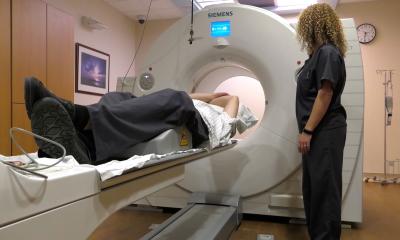
Image source: Adobe Stock/sebra
News • Patient empowerment
Shared decision making in cardiology: study shows benefits
New research involving the University of East Anglia has supported the use of shared decision making in cardiology, leading to more effective and safer care.
Shared decision making describes the process by which healthcare professionals and patients reach a joint decision about their care. This patient-centred approach allows patients to take a more active role in decisions about their health, and has been actively promoted for many conditions but recommendations of its use in cardiac clinical guidelines remain varied. Led by Royal Papworth Hospital clinicians, the study was a collaboration between hospitals and researchers in Cambridge, Norwich and Southampton, who investigated the effectiveness of existing strategies facilitating shared decision making in cardiology. The results have been published in the journal Heart.
These tools in cardiology improve patients’ understanding of treatment options, promotes patient involvement in their care, aids an informed decision process, improves communication between doctors and patients, and improves patient satisfaction
Harris Papadopoulou
More than 9,000 research items were screened to identify 159 studies which were then scrutinised by Dr Panagiota Mitropoulou (University Hospital Southampton NHS Foundation Trust) and Dr Nicolai Grüner-Hegge (Royal Papworth Hospital). From that, 18 randomised control trials were identified – including more than 4,400 patients – that used various interventions to facilitate shared decision making in cardiology. Harris Papadopoulou, NIHR Academic Clinical Lecturer in Cardiology at Royal Papworth Hospital and the University of Cambridge, who jointly-led the study, said: “The meta-analysis advocates the use of shared decision-making tools. It clearly shows that these tools in cardiology improve patients’ understanding of treatment options, promotes patient involvement in their care, aids an informed decision process, improves communication between doctors and patients, and improves patient satisfaction.”
Dr Johannes Reinhold, NIHR Academic Clinical Lecturer in Cardiology at Norfolk and Norwich University Hospitals and UEA’s Norwich Medical School, and Honorary Specialist Registrar at Royal Papworth Hospital, who was joint senior author, added: “This study was the first systematic review and meta-analysis investigating the effectiveness of shared decision making in cardiology. Whether it was printed aids, videos, computer programmes or direct education, this all reduced decisional conflict and suggested that patients were more content with their decisions. Interestingly, the findings were applicable to a wide range of cardiac conditions suggesting that this patient-centred approach could be helpful across the spectrum of cardiology. These results are really exciting and show the benefit of shared decision making in cardiology and why it should be used more frequently. We are now looking at ways to support this patient-centred approach in the care we provide.”
Source: University of East Anglia
25.10.2022





